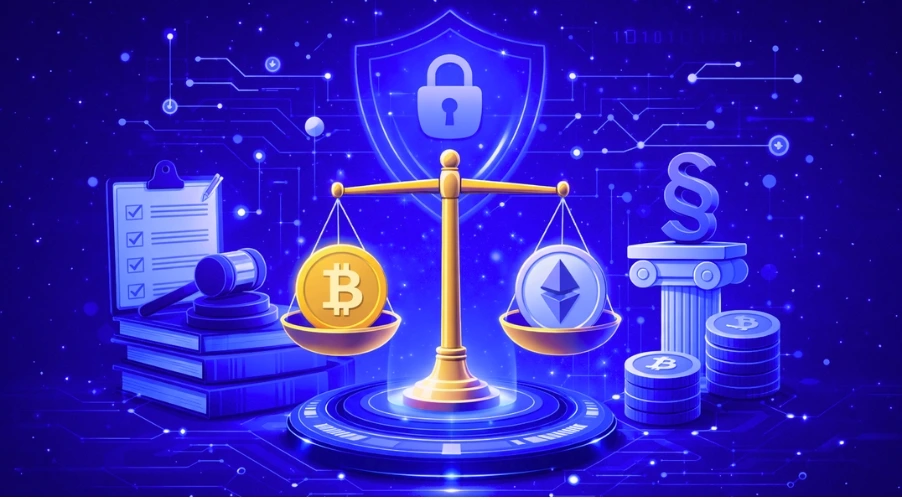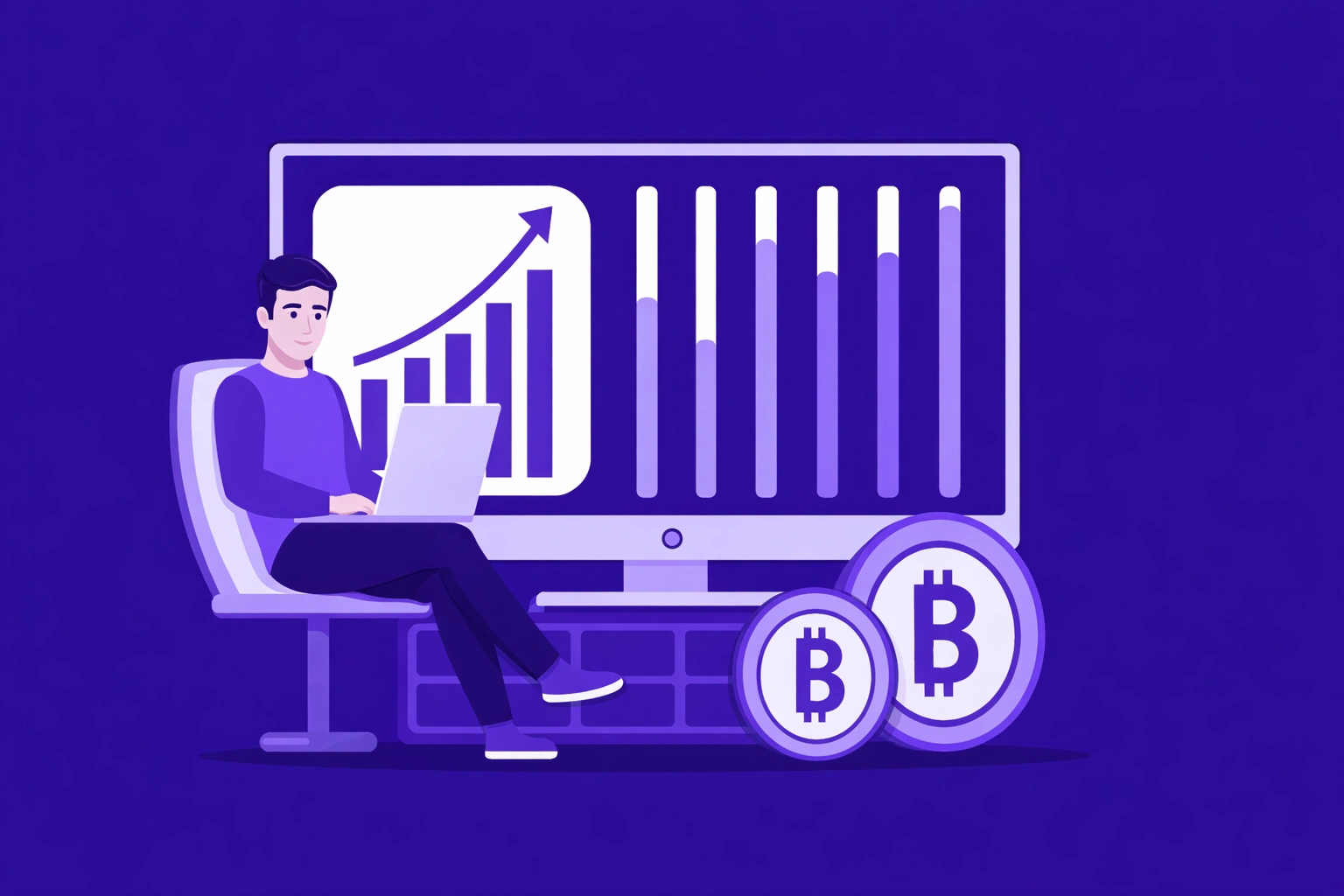The terms digital currency and cryptocurrency are often used interchangeably, but they represent fundamentally different approaches to electronic money. Understanding digital currency vs. crypto has become essential as 134 countries and currency unions representing 98% of global GDP are now exploring or developing central bank digital currencies, while cryptocurrency adoption continues expanding with stablecoins powering $46 trillion in annual transactions.[1] This guide covers centralization differences, regulatory frameworks, security mechanisms, transaction characteristics, and use cases for both digital currency and cryptocurrency systems.
Digital currencies encompass all forms of electronic money, including government-issued central bank digital currencies and privately developed cryptocurrencies like Bitcoin and Ethereum. The distinction matters because these systems operate under completely different governance structures, with implications for privacy, stability, and financial inclusion. The development of crypto token solutions continues advancing alongside government digital currency initiatives, creating diverse options for electronic payments and value storage.
Key Takeaways
- Digital currency includes all electronic money, while cryptocurrency specifically refers to decentralized blockchain-based assets
- CBDCs are controlled by central banks with full regulatory oversight, while cryptocurrencies operate through distributed networks
- 134 countries are exploring CBDCs representing 98% of global GDP, with three full launches completed
- Cryptocurrency adoption continues growing with $46 trillion in annual stablecoin transactions and $175 billion in ETF holdings
- Privacy differs significantly, with CBDCs enabling full government transaction monitoring while crypto offers pseudonymity
- Value stability favors CBDCs for everyday payments while cryptocurrency volatility suits investment and speculative use
- Both systems will likely coexist, serving different needs within the evolving digital financial ecosystem
Understanding Digital Currency
Digital currency is a broad category encompassing any money that exists only in electronic form. This includes central bank digital currencies issued by governments, electronic money held in bank accounts, and various digital payment systems. Unlike physical cash, digital currency has no tangible form and is stored and transferred through electronic networks.
Central bank digital currencies represent the government-backed segment of digital currency. These are digital versions of national fiat currencies issued and regulated by central banks, designed to function as legal tender with the same guarantees backing physical banknotes. The Bahamas, Jamaica, and Nigeria have fully launched CBDCs, while China’s digital yuan pilot has generated over 7 trillion yuan in transaction volume across 17 provincial regions.
How Central Bank Digital Currencies Work
CBDCs use centralized systems controlled by monetary authorities. The central bank maintains complete oversight of currency issuance, transaction monitoring, and policy implementation. Most CBDC designs use permissioned databases or distributed ledgers where the central bank and authorized institutions control access and verify transactions.
Two primary CBDC models exist: retail and wholesale. Retail CBDCs are designed for everyday consumer transactions, while wholesale CBDCs facilitate interbank settlements and securities transactions. Both maintain the central bank’s role as the ultimate authority over monetary policy and currency value.
Understanding Cryptocurrency
Cryptocurrency operates on fundamentally different principles than government-issued digital currency. These are decentralized digital assets that use cryptographic techniques and distributed networks to enable peer-to-peer transactions without central authority oversight. Bitcoin, Ethereum, and thousands of other cryptocurrencies function through consensus mechanisms maintained by network participants rather than centralized institutions.
The cryptocurrency market has matured significantly, with blockchains now processing over 3,400 transactions per second, representing 100x growth over five years. Traditional financial institutions including BlackRock, Fidelity, and JPMorgan Chase now offer cryptocurrency products, while exchange-traded products hold over $175 billion in onchain crypto assets.[2]
Blockchain Technology and Decentralization
Cryptocurrencies rely on blockchain technology to maintain transaction records across distributed networks. Instead of a central authority validating transactions, consensus mechanisms like proof-of-work or proof-of-stake enable network participants to verify and record transactions collectively. This decentralization eliminates single points of control or failure.
The development of crypto AI agents is enhancing how users interact with decentralized systems, automating trading strategies, portfolio management, and market analysis across cryptocurrency networks without requiring central intermediaries.
Differences Between Digital Currency and Crypto
Understanding digital currency vs. crypto requires examining several fundamental differences in how these systems operate, who controls them, and what purposes they serve. The following sections explore each major distinction in detail.
Centralized vs. Decentralized Control
Digital currencies issued by central banks operate under centralized control where the monetary authority makes all decisions about currency issuance, policy, and oversight. Central banks decide how much digital currency to create, set interest rates, and can modify rules at any time. This centralization provides stability but also means users depend entirely on institutional decisions.
Cryptocurrencies distribute control across network participants. No single entity can unilaterally change the rules or issue new currency outside predetermined protocols. Bitcoin’s monetary policy, for example, is encoded in its software and cannot be altered without network-wide consensus. This decentralization provides censorship resistance but removes the flexibility of central bank intervention.
Regulatory Framework
Digital currencies from central banks operate within established legal frameworks. They are legal tender in their jurisdictions, backed by government guarantees, and subject to existing financial regulations. Users have recourse through established legal channels if disputes arise, and consumer protections apply to transactions.
Cryptocurrency regulation varies dramatically across jurisdictions. The United States passed the GENIUS Act in 2025, creating the first federal regulatory framework for stablecoins, while the CLARITY Act defined digital commodities for assets on decentralized blockchains.[3] Some countries have embraced cryptocurrency while others maintain restrictions or outright bans.
Security Mechanisms
Central bank digital currencies rely on traditional security infrastructure combined with modern encryption. Banks and authorized institutions secure transactions using established cybersecurity practices, identity verification systems, and regulatory oversight. The central bank serves as the ultimate guarantor of system integrity.
Cryptocurrencies secure transactions through cryptographic protocols and consensus mechanisms. Once recorded on a blockchain, transactions become practically immutable. However, users bear responsibility for protecting their private keys. If a private key is lost or stolen, there is no central authority that can recover funds or reverse unauthorized transactions.
Transaction Speed and Fees
Central bank digital currencies are designed for instant or near-instant settlement within their networks. Since these systems operate through centralized infrastructure, transactions can process quickly without network congestion issues. The Federal Reserve’s FedNow system already enables real-time payments, and CBDCs would build on similar infrastructure.
Cryptocurrency transaction speeds vary significantly by network. Bitcoin processes approximately 7 transactions per second, while Solana can handle thousands. Network congestion during high-demand periods can slow transactions and increase fees on some networks. However, layer-2 solutions and newer blockchains have dramatically improved speed and reduced costs.
Privacy Considerations
Central bank digital currencies raise significant privacy concerns. These systems enable authorities to track all transactions, monitor spending patterns, and potentially restrict certain purchases. The Anti-CBDC Surveillance State Act passed by the US House reflects concerns about government visibility into citizens’ financial activities.
Cryptocurrency privacy varies by design. Bitcoin transactions are pseudonymous, visible on public blockchains but not directly tied to real identities. Privacy-focused cryptocurrencies offer stronger anonymity protections. However, regulatory pressure has pushed most exchanges to implement identity verification, reducing practical anonymity for many users.
Differences Between Digital Currency and Crypto Table Comparison
The following table provides a detailed comparison across all major characteristics, helping clarify the fundamental differences between government-backed digital currencies and decentralized cryptocurrencies.
| Feature | Digital Currency (CBDC) | Cryptocurrency |
|---|---|---|
| Issuing Authority | Central banks and governments | Decentralized networks, no central issuer |
| Control Structure | Centralized with full government oversight | Decentralized across network participants |
| Legal Status | Legal tender backed by government | Varies by jurisdiction, not legal tender |
| Value Stability | Stable, pegged to national currency | Highly volatile, market-determined |
| Technology | Permissioned databases or DLT | Public blockchain with consensus |
| Privacy Level | Low, government can monitor all transactions | Pseudonymous to anonymous depending on design |
| Transaction Recovery | Possible through central authority | Generally irreversible, user responsibility |
| Supply Control | Unlimited, determined by central bank policy | Predetermined or algorithmic, often capped |
| Primary Use Case | Daily payments, government benefits, taxes | Investment, DeFi, cross-border payments |
| Global Accessibility | Limited to issuing country jurisdiction | Borderless, accessible worldwide |
| Interest/Yield | May pay interest set by central bank | Staking rewards, DeFi yields available |
| Consumer Protection | Full regulatory protection applies | Limited, depends on platform and jurisdiction |
Use Cases and Practical Applications
Both digital currencies and cryptocurrencies serve distinct purposes in the evolving financial landscape. Understanding these use cases helps determine which system best fits specific needs.
Digital Currency Applications
Central bank digital currencies excel at providing fast, low-cost domestic payments with full regulatory protection. Governments can use CBDCs for efficient benefit distribution, tax collection, and disaster relief payments directly to citizens. Financial inclusion improves as unbanked populations gain access to digital money through simple mobile applications.
Cross-border payment efficiency is another target for CBDC development. The mBridge project involving multiple central banks aims to reduce international transfer costs and settlement times. Corporate treasurers view CBDCs favorably for eliminating commercial bank counterparty risk in large transactions.
Cryptocurrency Applications
Cryptocurrency enables borderless value transfer without depending on traditional banking infrastructure. Stablecoins have become particularly important for cross-border payments, with Visa and US banks settling obligations in USDC on Solana. Working with a crypto OTC desk helps institutional investors execute large cryptocurrency transactions without significant market impact.
Decentralized finance applications built on cryptocurrency networks provide lending, borrowing, and yield-generating opportunities outside traditional banking. Investment portfolios increasingly include cryptocurrency exposure through regulated products, with 52% of Americans who have owned crypto reporting positive investment returns.[4]
Build Digital Currency & Crypto Solutions
Work with experienced blockchain developers to design secure CBDC integrations, stablecoin systems, or decentralized applications tailored to your compliance, scalability, and global payment needs today.
Risks and Considerations
Both digital currencies and cryptocurrencies carry distinct risk profiles that users should understand before adoption.
Digital Currency Risks
Privacy concerns top the list for CBDC critics, who worry about government surveillance of all financial activities. Technical failures in centralized systems could disrupt entire economies. Inflation risk remains if central banks issue excessive digital currency, similar to traditional fiat currency concerns.
Banking disintermediation poses systemic risks if citizens shift deposits from commercial banks to CBDCs during financial stress, potentially triggering bank runs and credit contraction. Central banks would need to implement holding limits or other controls to manage this risk.
Cryptocurrency Risks
Price volatility remains cryptocurrency’s most significant risk factor. Bitcoin and other cryptocurrencies can experience dramatic price swings, making them unsuitable as stable stores of value for risk-averse users. This volatility has limited cryptocurrency adoption for everyday payments.
Security responsibility falls entirely on users in decentralized systems. Lost private keys mean permanently inaccessible funds with no recovery mechanism. Scams and fraudulent projects continue targeting inexperienced users. However, regulated products like ETFs now provide cryptocurrency exposure with traditional custody protections. While exploring different blockchain ecosystems, some investors also consider emerging opportunities like solana meme coin projects, though these carry higher speculative risk.
Future Outlook
The digital currency vs. crypto landscape continues evolving as both systems mature and potentially converge in certain applications. CBDCs will likely expand as more countries move from pilot programs to full deployment, potentially reshaping how governments distribute benefits and collect payments.
Cryptocurrency infrastructure continues integrating with traditional finance, with major institutions now offering crypto products and services. Stablecoins bridge both worlds, offering cryptocurrency’s programmability with fiat currency stability. The coexistence of CBDCs and cryptocurrencies appears increasingly likely, serving different user needs within complementary roles.
Conclusion
Understanding digital currency vs. crypto requires recognizing their fundamentally different approaches to electronic money. Central bank digital currencies offer stability, regulatory protection, and seamless integration with existing financial systems but sacrifice privacy and decentralization. Cryptocurrencies provide borderless access, censorship resistance, and user sovereignty but require accepting volatility and personal security responsibility.
Both systems are evolving rapidly as governments develop CBDC frameworks and cryptocurrency infrastructure matures through institutional adoption. The future likely includes both systems serving complementary roles, with CBDCs handling domestic payments and government transactions while cryptocurrencies enable global value transfer, decentralized finance, and investment opportunities.
Frequently Asked Questions
Digital currency encompasses all electronic money including government-issued CBDCs and bank deposits. Cryptocurrency specifically refers to decentralized digital assets using blockchain technology without central authority control or government backing.
No, CBDCs and Bitcoin are fundamentally different. CBDCs are centralized government-issued currencies with full regulatory oversight. Bitcoin is decentralized, operates without central control, and has a fixed supply cap.
CBDCs offer regulatory protection and transaction recovery options but enable government surveillance. Cryptocurrency provides user control and privacy but requires personal security responsibility with no recovery for lost keys.
Governments can restrict cryptocurrency exchanges and make usage illegal, but decentralized networks continue operating regardless of bans. Several countries with cryptocurrency restrictions still show significant peer-to-peer trading activity.
Most CBDC designs complement rather than replace physical cash. Central banks recognize some populations prefer cash and plan continued availability. However, CBDC adoption may gradually reduce cash usage over time.
Three countries have fully launched CBDCs: the Bahamas, Jamaica, and Nigeria. China’s digital yuan is in advanced pilot stage with massive adoption. Over 134 countries are researching or developing CBDCs.
Reviewed & Edited By

Aman Vaths
Founder of Nadcab Labs
Aman Vaths is the Founder & CTO of Nadcab Labs, a global digital engineering company delivering enterprise-grade solutions across AI, Web3, Blockchain, Big Data, Cloud, Cybersecurity, and Modern Application Development. With deep technical leadership and product innovation experience, Aman has positioned Nadcab Labs as one of the most advanced engineering companies driving the next era of intelligent, secure, and scalable software systems. Under his leadership, Nadcab Labs has built 2,000+ global projects across sectors including fintech, banking, healthcare, real estate, logistics, gaming, manufacturing, and next-generation DePIN networks. Aman’s strength lies in architecting high-performance systems, end-to-end platform engineering, and designing enterprise solutions that operate at global scale.






